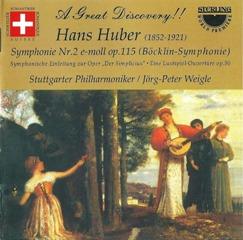Hans Huber - Symphony No. 2, Eine Lustspiel-Ouvertuere (Weigle) [1996]
Hans Huber - Symphony No. 2, Eine Lustspiel-Ouvertuere (Weigle) [1996]

1.Huber, Hans : Symphonische Einleitung ‘Der Simplicius,’ opera
2.Huber, Hans : Eine Lustspiel Ouverture, Op. 50
Huber, Hans : Symphonie no 2 in E major ("Bocklin-Symphonie"), Op. 115
3. Allegro con fuoco
4. Allegro con fuoco non troppo – Con fuoco - L’istesso tempo – Tempo I
5. Adagio ma non troppo
6. Finale: Metamorphosen, abgeregt durch Bilder von Bocklin
Günther Maysenhölder (Organ)
Matthias Wächter (Violin)
Stuttgarter Philharmoniker
Jorg-Peter Weigle, conductor
Recorded December 2-4 1996 at the Stadthalle Sindelfingen, Germany.
Huber was a Swiss composer whose music and life straddled the nineteenth and twentieth centuries. The music itself remains resolutely a product of vintage nineteenth century romanticism. Nothing desperately original here but whoever said that music had to be original to be enjoyable. If you enjoy Brahms, Dvorák, Stanford, Smetana, Fibich or Suk delay no longer. These discs are for you.
His grounding in music came from his father, a skilled amateur musician. He became a chorister at Solothurn but made such astounding progress with his piano studies that he switched from an ecclesiastical learning environment to a secular college. From 1870 to 1874 he attended Leipzig Conservatory studying with Reinecke. He then taught in the Alsace until, in 1877, he came to Basel. Denied a place at the Basel Conservatory until 1889, once ensconced, he soon made rapid progress as his works gained recognition. By 1896 he had been appointed Director. He died in Locarno in 1921 in the same year as Saint-Saëns.
Der Simplicius (1898): There are five Huber operas (six if you count the unfinished Der Gläserne Berg) of which Der Simplicius is the third. The overture is Mephistophelian - buzzing with whippy impetuosity. It will appeal to those who like Elgar's Froissart Overture and Smetana's symphonic poems Haakon Jarl and Richard III.
Eine Lustspiel-Ouverture (1879) is very attractive: calming but also with the slaloming vigour of Dvorak Symphonies 5 and 6 and Schumann's Rhenish Symphony.
The first and second movements of the Böcklin Symphony blaze with activity inflamed by the same drive as those two Dvorák symphonies. When the fires burn on a lower pressure a honeyed Brahmsian tone tempers the Dvorakian element. The third movement adagio has a willowy fluency with pointillistic effects from harp and solo violin ending in the autumnal sunshine familiar from Brahms' Third Symphony. The finale is a free fantasy inspired by a gallery of paintings by Arnold Böcklin (yes, the same Böcklin whose Isle of the Dead inspired Rachmaninov and Max Reger's Four Böcklin Tone Poems.). The movement is, by turns, jaunty, passionate and butterfly textured. So airy is some of the orchestration that we are almost into Berlioz at his most impressionistic as in Symphonie Fantastique. Set off against this a Brahmsian gravitas. The performance is excellent - infused with flammable temperament and an impressive unanimity of attack. A welcome change from Dvorák 5 and 6. Do try it! ---Rob Barnett, musicweb-international.com
download (mp3 @320 kbs):
uploaded yandex 4shared mediafire mega solidfiles zalivalka cloudmailru filecloudio oboom








